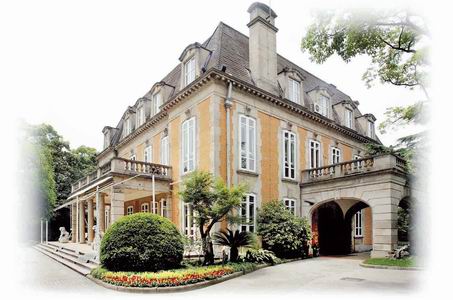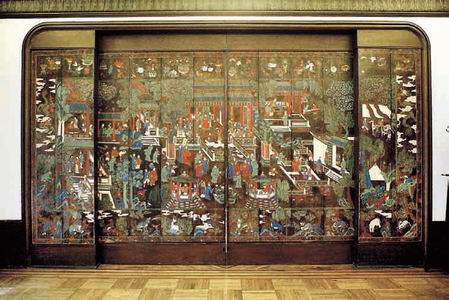Shanghai Daily news

Taiyuan Guesthouse on Taiyuan Road used to be home to
American General George Marshall in the 1940s.

The coromandel screen divides the dinning room and
drawing room on the first floor in the house.
Taiyuan Guesthouse, or Taiyuan Villa as it is known in Chinese, is best known
among lovers of small, intimate hotels in Shanghai. At US$300 a night, you can
stay in General George Marshall's antique rosewood bed in this lovely
French-style castle on Taiyuan Road.
"We have nine rooms and usually host
minister-level leaders," says Rebecca Tan from the Taiyuan Guesthouse. "When we
don't have dignitaries visiting, we are open to ordinary customers, most of whom
are foreigners and have found out about the house from travel guides or
friends."
Tan says only a few changes have been made to this mansard-roofed
villa, first built in 1920s, during redecoration. Original traces are
everywhere, from the teak floor, to the wrought iron in the fireplaces, from the
beautiful curved iron stairs to the black-toned coromandel screen, which is
inlaid to pocket doors to separate the dining room and drawing room.
American
General George Marshall lived and worked in the house from December 1945 when he
was trying to negotiate a peace settlement between the Communist Party of China
and Kuomintang. The negotiations broke down in November 1946 and Marshall left
the house with regret and sorrow two months later.
The first floor was his
dining and drawing room, which are now part of a Shanghai-style restaurant. His
bedroom is on the second floor, which is a two-room suite with a set of rosewood
furniture with exquisite carvings. Two antique closets flank the Chinese-style
rosewood bed. The spacious bathroom is lavishly decorated with white
marble.
Birds chirp in the garden that covers 8,780 square meters and looks
like a fairyland, dotted with green camphor, red maple and golden Chinese
parasol trees.
The house is also known as "Marshall House" but the fate of
its first owner is more of a legend than the general himself. The house used to
belong to a French civil servant Comte Maurice Frederic Armand du Pac de
Marsoulies, who moved to Shanghai in 1918 after retirement and worked as an
international lawyer. He and his wife had two children.
"The Chinese have
been saying for years that this old house belonged to a British family called
Marcus," says Tess Johnson, a well-known historian on Western-style architecture
in China who has written about the villa in her book "Frenchtown
Shanghai."
"That is because they rendered the original name du Pac de
Marsoulies as Marcus and thus British," she adds. "He was a French count and his
coat of arms is on the fireplace. His wife was also French and I have spoken
personally to her children, who now live in England. The man was assassinated by
Du Yuesheng in 1933 following a famous banquet."
Johnson has written about
this bloody family history in her book.
"He (Comte) prospered, but his career
came to an abrupt end in 1933, when he was not yet 60 years old. Shortly after
taking part in the Paris-Peking Citroen Rally, he was invited, along with
several other French officials, to dine with the boss of Shanghai's Green Gang,
the infamous Du Yuesheng. This was during a period when there was a turf war
over the distribution and sale of opium and 'Papa Du' was threatened by the
French authorities with the loss of what had been his virtual monopoly. In any
event, the dinner was sumptuous and the event cordial but, alas, within three
weeks three of the diners were dead. All were French and they included the
Comte."
The man's widow Ginette lived comfortably after being left with a
large sum of money and this large house. She was given the nickname "The Merry
Widow." She sold the house in 1940 to a Chinese man for 220 pieces of gold bars,
who then rented it to the Japanese. US Army General Albert C. Wedemeyer has also
rented the house.
After 1949 it became a state-owned guesthouse where
Chairman Mao Zedong's last wife Jiang Qing often lived during her frequent trips
to Shanghai.
Tan says Jiang wanted the house carpeted in an apple green
color, which was her favorite.
"It is a typical French manor house which has
had such a long and varied history," says Johnson. "It's been lived in by 'The
Merry Widow,' a Chinese, a Japanese general and Generals Wedemeyer and
Marshall."
Today, no matter where you walk in the house or the garden, a
sensitive visitor will see and smell traces of the past.



